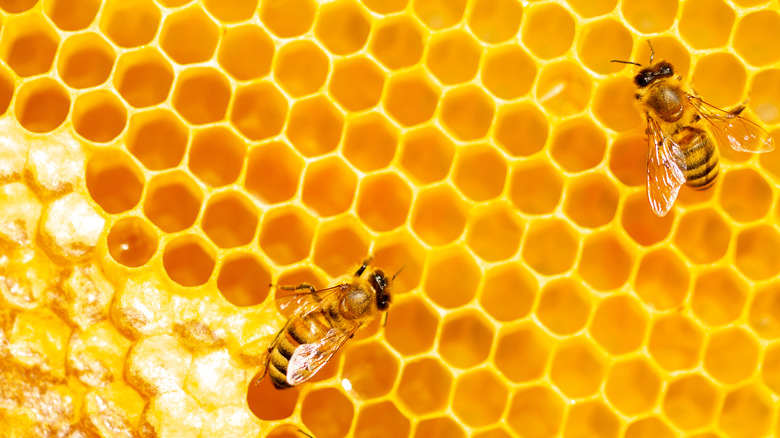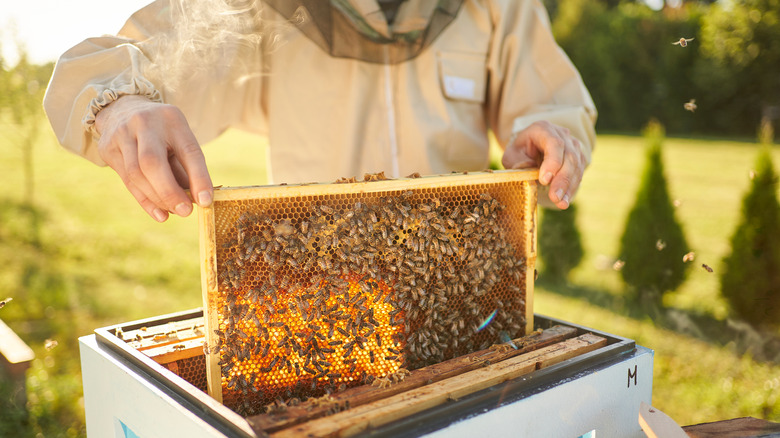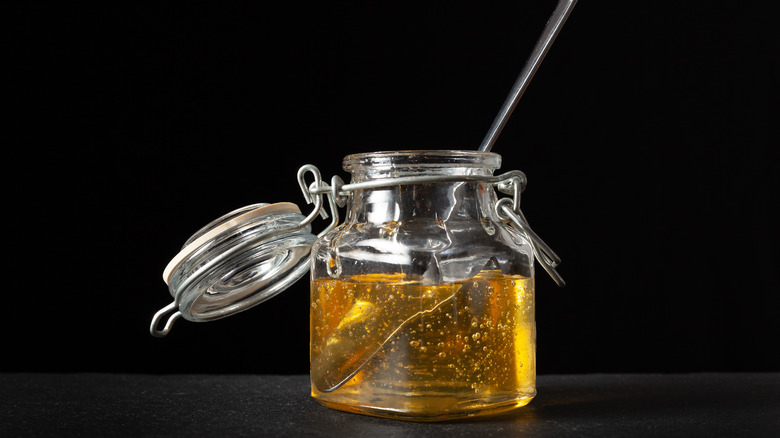Can You Eat Honey If You're Vegan?
Honeybees, as well as other pollinators, are crucial to life. Planet Bee reported that in 2021, 45.5% of managed beehives in the U.S. collapsed. That is a scary statistic because without bees, there would be no food. It's vitally important to do everything possible to protect them, and we can't afford to lose a single one.
Bees love honey just like people do. What's not to love? It is a fantastic substance. Honey never spoils, it has health benefits—although it should never be given to a child under the age of one—and it can be used as a cough syrup. People have used honey for centuries, including the ancient Egyptians, who thought so highly of the sticky substance that they would offer it as a gift to their gods (per Honey Association). With so many advantages and such a long history, you'd think everyone would want to eat it. But is honey vegan?
Most people understand what vegans do not eat — no meat, dairy, or eggs. Vegans avoid using animal products, including leather and silk products, but what's the buzz about honey?
Do no harm
From an ethical standpoint, vegans believe that animals—even insects—are not ours to use in any manner. Many vegans think that because honey is a food made by bees, it should only be consumed by bees and to take that honey for our use is wrong. Vegans believe in ahimsa, a Sanskrit word meaning "do no harm." Unfortunately, commercial honey harvesting can often harm the bees.
Bees produce honey to sustain them through the winter; however, many commercial honey producers will replace the honey they take from the hive with corn syrup or sucrose, which does not provide the nutrients necessary for the health of the bees (via Healthline). A lack of nutrients can weaken a bee's immune system, making it more prone to the damaging effects of pesticides and more vulnerable to deadly illnesses.
Commercial beekeeping practices don't always consider our fuzzy friends during the business of honey production. In the same way birds in factory farms are destroyed when there's an outbreak of bird flu, bees are often culled if there's an outbreak of disease that could spread throughout the hive or simply if the beekeeper doesn't want to continue to feed the hive throughout the winter (via Guardian). Bees can be accidentally killed during the harvesting process as well (per Food Empowerment Project).
Sweet substitutes
Making honey is hard work for the bees. According to Live Science, a bee has to visit over one thousand flowers to collect enough nectar to fill its belly. Once it's full, it returns to the hive to vomit out the contents of its stomach. The nectar is then passed from one bee's mouth to another to chew until it's transformed into honey and stored in the hive to be eaten later. If thinking about honey as bee barf doesn't turn you off, nothing will.
If your appetite for honey has been lost, don't worry — you have options. Substitutes like agave nectar, corn syrup, or molasses can often be used in recipes in place of honey. There are even commercial honey substitutes, like Bee Free, made from apples.
You can do your part to protect the bees by planting native flowers and other plants that attract them. Set up a place for them to build a hive away from people and let them do their thing without intervention. It's the sweetest way for you and the bees to live.


